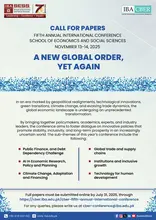
World Conference on Human Rights 1993
Read a summary using the INOMICS AI tool
When thinking about conferences, we most often discuss academic conferences. However, throughout the twentieth century, the conference was an important meeting format for politicians and diplomats as well as academics. Some of the most important historical events of the century involved conference meetings which had a huge impact on national and international policy. One such key conference was the World Conference on Human Rights in 1993, which was the first human rights conference since the end of the Cold War and which was instrumental in specifying universal human rights.
Download the Conference Monkey Directory - 6 Month Conference List

How Did the Conference Come About?
In 1989, the General Assembly of the UN decided that they would call a world meeting to discuss the topic of human rights. In particular, they wanted to see what progress had been made in the area of human rights since the passing of the historic Universal Declaration of Human Rights in December 1948. As well as human rights more generally, the Assembly wanted to tackle modern issues of rights and democracy, such as the relationship between development and humans rights, including social, economic, cultural, civil, and political rights.
When and Where Was the Conference Held?
The main conference was held over two weeks from 14th - 25th June 1993 in Vienna, Austria. After the ending of the Cold War and the dissolution of the Soviet Union in 1991, it was decided that a conference was necessary to bring together superpowers and developing nations to promote peace and avoid further international confrontations.
The conference was begun with the work of a Preparatory Committee who held meetings in Geneva, Switzerland during the period of September 1991 to May 1993. This committee created a draft of the declaration that was to be discussed during the conference, hosted by the Austrian government. Three regional meetings were held in advance of the conference, in Tunis, San José, and Bangkok, where the perspective of delegates from the Caribbean and Asian and Pacific regions were discussed. As well as this, there were preparatory meetings held in Europe and North America to gather perspectives on the topic of human rights.
Who Attended the Conference?
Representatives of 171 states attended, with around 7,000 participants in total. The participants included academics, national institutions, representatives of treaty bodies such as the Human Rights Committee or the Committee on the Rights of the Child, and representatives of over 800 non-governmental organisations. With so many participants, the conference was the largest ever gathering on the topic of human rights.
The conference was lead by the then United Nations Secretary-General Boutros Boutros-Ghali, an Egyptian diplomat and politician who served as Secretary-General of the UN from January 1992 to December 1996. He described the conference as vital in the process of forming “a new vision for global action for human rights into the next century”. Another key figure in attendance was Mr. Ibrahima Fall, the Secretary-General of the Conference, a political leader from Senegal who worked as the UN Under Secretary in charge of human rights and Director of the Center for Human Rights in Geneva from 1992 to 1997.
What Was Discussed at the Conference?
A challenge of the conference was that although the purpose of the meeting was to discuss human rights, agreements made in the preliminary period of the conference stated that human rights were only to be discussed in the abstract. The discussion of specific human rights abuses by particular nations was forbidden, in an attempt to keep discussion to the principles of human rights rather than allowing arguments about particular nations or events to dominate. In practice, however, the delegates found it was impossible not to reference relevant events in the area of human rights such as the movement of refugees or the persecution of religious minorities.
A schism formed between Western nations who wanted to prescribe human rights as universal, and a contingent of non-Western nations who felt that this was interference in their independent governance. In the end, the universality of human rights was accepted and all nations agreed on a declaration of these rights as a result of the conference.
What Were the Results of the Conference?
The most important outcome of the conference was the establishment of the Vienna Declaration and Programme of Action. This document laid out an approach to human rights that we still use today, acknowledging human rights as universal and applicable to all people in all countries. In particular, the declaration lays out the right to development, meaning that developing nations should be supported in achieving economic development for the security and well-being of their people.
Other rights specified in the declaration included the right to seek asylum and humanitarian aid, meaning that any person from any country can seek asylum in another country if they will suffer from persecution in their home country. The relationship between democracy, development, and human rights was considered, with the declaration stating that “Democracy, development and respect for human rights and fundamental freedoms are interdependent and mutually reinforcing. Democracy is based on the freely expressed will of the people to determine their own political, economic, social and cultural systems and their full participation in all aspects of their lives.” Therefore, the promotion of human rights and democracy are seen as essentially intertwined.
Vulnerable groups were also recognised in the declaration, with sections dedicated to the human rights of women, ethnic or racial minorities, people with disabilities, and migrant workers. Children were also recognised as a group requiring human rights protections of their own, such as rights to education and to health care, protections against child labour or sexual abuse, and the right to safe drinking water.
What Was the Historical Importance of the Conference?
The conference is remembered for its importance in establishing the Declaration, which forms the basis for the modern view of human rights internationally. In the 25 years since the conference, it remains a crucial part of the history of improved rights for people all around the world. The worldwide acceptance of development and economic, social, cultural, civil, and political rights as universal can be traced directly back to this conference and the declaration that it produced.
The protections laid out in the declaration for women, children, people with disabilities, and regional institutions are now part of international law, so if they are breached then people can bring a complaint to an international human rights body. Further, rights for these minority groups and for women, in particular, are now acknowledged as a fundamental part of human rights. A special council, the Human Rights Council, was established in 2006 to perform tasks such as a Universal Periodic Review which looks at the human rights records of all UN members. The council also works to investigate allegations of human rights abuses and to promote rights such as freedom of association, freedom of expression, women's rights, LGBTQ rights, and protections for racial and ethnic minorities.
Much of the discussion around human rights today takes for granted that human rights are universal and agreed on. However, this understanding is relatively recent and is a direct result of the World Conference. Were it not for this historic conference, it is likely that our international conception of human rights would not be where it is today.
Download the Conference Monkey Directory - 6 Month Conference List
Top Blog Posts to Read:
What's the difference between a conference, a seminar, a workshop and a symposium?
8 Benefits of Attending Conferences
What Should Women Wear to Academic Conferences?
What Should Men Wear To Academic Conferences?
A Guide to Asking Good Questions at Conferences
How To Improve Your Public Speaking
-
- Conferenza
- Posted 3 months ago
Frontiers of Causal Inference and Machine Learning
Between 8 Jul and 11 Jul in Lucca, Italia -
- Evento
- Posted 6 months ago
Summer School 2025: Cognitive Foundations of Decision-Making
Between 30 Jun and 4 Jul in Gent, Belgio -
- Conferenza
- Posted 2 months ago
1st International Conference on Applied Economics and Financial Issues (AEFI)
Between 28 Aug and 29 Aug in Thessaloníki, Grecia












